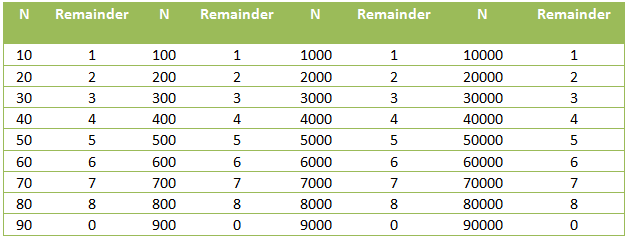Divisibility by 9
This is the 8th part of the Divisibility Rules Series. In this post, we discuss divisibility by 9.
When 10 is divided by 9, it gives a remainder of 1 since 10 = 9 + 1. Also, 100 divided by 9 gives a remainder of 1 since 100 = 99 + 1. Further, 1000 gives a remainder of 1 when divided by 9 since it can be expressed as 999 + 1. From the pattern, we can see that powers of 10 give a remainder of 1 when divided by 9 since they can be expressed as 999…9 + 1.
In addition, observe from the table that 20 divided by 9 is equal to 2, and 300 divided by 9 = 3, 5000 divided by 9 = 5. We can see that a positive integer n less than 9 multiplied by a power of 10 gives a remainder of n when divided by 9. Now since 3465 can be expressed as 3000 + 4000 + 60 + 5 = 3(103) + 4(102) + 6(101) + 5(100), we can use the expanded form to determine divisibility by 9. For example, in the second table, the remainders of the expansion are 3, 4, 6, and 5. We now take the sum of these remainders and see if they are divisible by 9. » Read more

